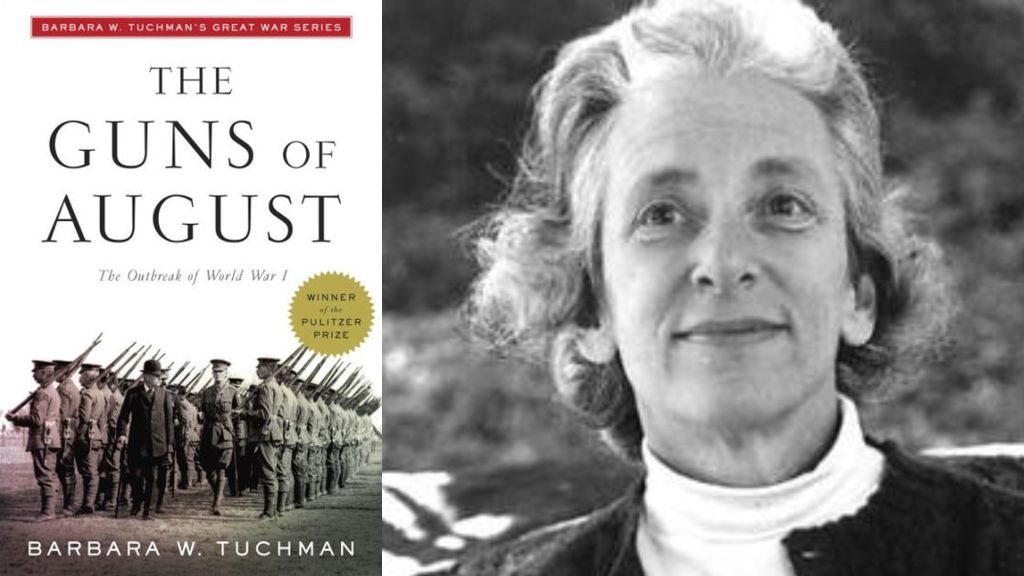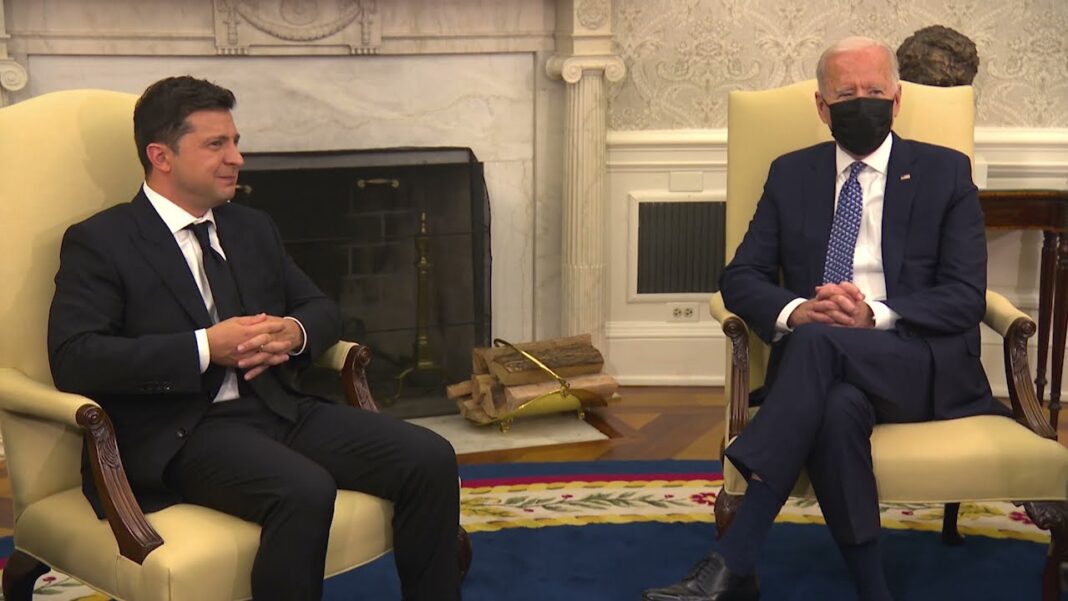Selected by the Modern Library as one of the 100 best nonfiction books of all time
The Proud Tower, the Pulitzer Prize–winning The Guns of August, and The Zimmerman Telegram comprise Barbara W. Tuchman’s classic histories of the First World War era
In The Guns of August, the landmark, Pulitzer Prize–winning account, renowned historian Barbara W. Tuchman re-creates the first month of World War I: thirty days in the summer of 1914 that determined the course of the conflict, the century, and ultimately our present world. Beginning with the funeral of Edward VII, Tuchman traces each step that led to the inevitable clash. And inevitable it was, with all sides plotting their war for a generation. Dizzyingly comprehensive and spectacularly portrayed with her famous talent for evoking the characters of the war’s key players, Tuchman’s magnum opusis a classic for the ages.

Praise for The Guns of August
“Fascinating . . . One of the finest works of history written . . . A splendid and glittering performance.”
–The New York Times
“A brilliant piece of military history which proves up to the hilt the force of Winston Churchill’s statement that the first month of World War I was ‘a drama never surpassed.’”—Newsweek
“[A] BEAUTIFULLY ORGANIZED, COMPELLING NARRATIVE.”
–San Francisco Chronicle
“More dramatic than fiction . . . a magnificent narrative—beautifully organized, elegantly phrased, skillfully paced and sustained.”—Chicago Tribune
“A fine demonstration that with sufficient art rather specialized history can be raised to the level of literature.”—The New York Times
“[The Guns of August] has a vitality that transcends its narrative virtues, which are considerable, and its feel for characterizations, which is excellent.”—The Wall Street Journal
“AN EPIC NEVER FLAGGING IN SUSPENSE . . . It seemed hardly possible that anything new of significance could be said about the prelude to and the first month of World War I. But this is exactly what Mrs. Tuchman has succeeded in doing . . . by transforming the drama’s protagonists as well as its immense supporting cast, from half-legendary and half shadowy figures into full-dimensional, believable persons.”
–The Christian Science Monitor

About the Author
Barbara W. Tuchman (January 30, 1912 – February 6, 1989) was an American historian and author. She achieved prominence as a historian with The Zimmermann Telegram and international fame with The Guns of August, a best-selling history of the prelude to and the first month of World War I which won the Pulitzer Prize. There followed five more books: The Proud Tower, Stilwell and the American Experience in China (a biography of General Joseph Stilwell which also awarded the Pulitzer Prize), A Distant Mirror, Practicing History, and The March of Folly. The First Salute was Mrs. Tuchman’s last book before her death in February 1989.
Tuchman focused on writing popular history.
Excerpt. © Reprinted by permission. All rights reserved.
1
A Funeral
So gorgeous was the spectacle on the May morning of 1910 when nine kings rode in the funeral of Edward VII of England that the crowd, waiting in hushed and black-clad awe, could not keep back gasps of admiration. In scarlet and blue and green and purple, three by three the sovereigns rode through the palace gates, with plumed helmets, gold braid, crimson sashes, and jeweled orders flashing in the sun. After them came five heirs apparent, forty more imperial or royal highnesses, seven queens—four dowager and three regnant—and a scattering of special ambassadors from uncrowned countries. Together they represented seventy nations in the greatest assemblage of royalty and rank ever gathered in one place and, of its kind, the last. The muffled tongue of Big Ben tolled nine by the clock as the cortege left the palace, but on history’s clock it was sunset, and the sun of the old world was setting in a dying blaze of splendor never to be seen again.
In the center of the front row rode the new king, George V, flanked on his left by the Duke of Connaught, the late king’s only surviving brother, and on his right by a personage to whom, acknowledged The Times, “belongs the first place among all the foreign mourners,” who “even when relations are most strained has never lost his popularity amongst us”—William II, the German Emperor. Mounted on a gray horse, wearing the scarlet uniform of a British Field Marshal, carrying the baton of that rank, the Kaiser had composed his features behind the famous upturned mustache in an expression “grave even to severity.” Of the several emotions churning his susceptible breast, some hints exist in his letters. “I am proud to call this place my home and to be a member of this royal family,” he wrote home after spending the night in Windsor Castle in the former apartments of his mother. Sentiment and nostalgia induced by these melancholy occasions with his English relatives jostled with pride in his supremacy among the assembled potentates and with a fierce relish in the disappearance of his uncle from the European scene. He had come to bury Edward his bane; Edward the arch plotter, as William conceived it, of Germany’s encirclement; Edward his mother’s brother whom he could neither bully nor impress, whose fat figure cast a shadow between Germany and the sun. “He is Satan. You cannot imagine what a Satan he is!”

This verdict, announced by the Kaiser before a dinner of three hundred guests in Berlin in 1907, was occasioned by one of Edward’s continental tours undertaken with clearly diabolical designs at encirclement. He had spent a provocative week in Paris, visited for no good reason the King of Spain (who had just married his niece), and finished with a visit to the King of Italy with obvious intent to seduce him from his Triple Alliance with Germany and Austria. The Kaiser, possessor of the least inhibited tongue in Europe, had worked himself into a frenzy ending in another of those comments that had periodically over the past twenty years of his reign shattered the nerves of diplomats.
Happily the Encircler was now dead and replaced by George who, the Kaiser told Theodore Roosevelt a few days before the funeral, was “a very nice boy” (of forty-five, six years younger than the Kaiser). “He is a thorough Englishman and hates all foreigners but I do not mind that as long as he does not hate Germans more than other foreigners.” Alongside George, William now rode confidently, saluting as he passed the regimental colors of the 1st Royal Dragoons of which he was honorary colonel. Once he had distributed photographs of himself wearing their uniform with the Delphic inscription written above his signature, “I bide my time.” Today his time had come; he was supreme in Europe.
Behind him rode the widowed Queen Alexandra’s two brothers, King Frederick of Denmark and King George of the Hellenes; her nephew, King Haakon of Norway; and three kings who were to lose their thrones: Alfonso of Spain, Manuel of Portugal and, wearing a silk turban, King Ferdinand of Bulgaria who annoyed his fellow sovereigns by calling himself Czar and kept in a chest a Byzantine Emperor’s full regalia, acquired from a theatrical costumer, against the day when he should reassemble the Byzantine dominions beneath his scepter.
Dazzled by these “splendidly mounted princes,” as The Times called them, few observers had eyes for the ninth king, the only one among them who was to achieve greatness as a man. Despite his great height and perfect horsemanship, Albert, King of the Belgians, who disliked the pomp of royal ceremony, contrived in that company to look both embarrassed and absentminded. He was then thirty-five and had been on the throne barely a year. In later years when his face became known to the world as a symbol of heroism and tragedy, it still always wore that abstracted look, as if his mind were on something else.
The future source of tragedy, tall, corpulent, and corseted, with green plumes waving from his helmet, Archduke Franz Ferdinand of Austria, heir of the old Emperor Franz Josef, rode on Albert’s right, and on his left another scion who would never reach his throne, Prince Yussuf, heir of the Sultan of Turkey. After the kings came the royal highnesses: Prince Fushimi, brother of the Emperor of Japan; Grand Duke Michael, brother of the Czar of Russia; the Duke of Aosta in bright blue with green plumes, brother of the King of Italy; Prince Carl, brother of the King of Sweden; Prince Henry, consort of the Queen of Holland; and the Crown Princes of Serbia, Rumania, and Montenegro. The last named, Prince Danilo, “an amiable, extremely handsome young man of delightful manners,” resembled the Merry Widow’s lover in more than name, for, to the consternation of British functionaries, he had arrived the night before accompanied by a “charming young lady of great personal attractions” whom he introduced as his wife’s lady in waiting with the explanation that she had come to London to do some shopping.

A regiment of minor German royalty followed: rulers of Mecklenburg-Schwerin, Mecklenburg-Strelitz, Waldeck-Pyrmont, Saxe-Coburg Gotha, of Saxony, Hesse, Württemberg, Baden, and Bavaria, of whom the last, Crown Prince Rupprecht, was soon to lead a German army in battle. There were a Prince of Siam, a Prince of Persia, five princes of the former French royal house of Orléans, a brother of the Khedive of Egypt wearing a gold-tasseled fez, Prince Tsia-tao of China in an embroidered light-blue gown whose ancient dynasty had two more years to run, and the Kaiser’s brother, Prince Henry of Prussia, representing the German Navy, of which he was Commander in Chief. Amid all this magnificence were three civilian-coated gentlemen, M. Gaston-Carlin of Switzerland, M. Pichon, Foreign Minister of France, and former President Theodore Roosevelt, special envoy of the United States.
Edward, the object of this unprecedented gathering of nations, was often called the “Uncle of Europe,” a title which, insofar as Europe’s ruling houses were meant, could be taken literally. He was the uncle not only of Kaiser Wilhelm but also, through his wife’s sister, the Dowager Empress Marie of Russia, of Czar Nicolas II. His own niece Alix was the Czarina; his daughter Maud was Queen of Norway; another niece, Ena, was Queen of Spain; a third niece, Marie, was soon to be Queen of Rumania. The Danish family of his wife, besides occupying the throne of Denmark, had mothered the Czar of Russia and supplied kings to Greece and Norway. Other relatives, the progeny at various removes of Queen Victoria’s nine sons and daughters, were scattered in abundance throughout the courts of Europe.
Yet not family feeling alone nor even the suddenness and shock of Edward’s death—for to public knowledge he had been ill one day and dead the next—accounted for the unexpected flood of condolences at his passing. It was in fact a tribute to Edward’s great gifts as a sociable king which had proved invaluable to his country. In the nine short years of his reign England’s splendid isolation had given way, under pressure, to a series of “understandings” or attachments, but not quite alliances—for England dislikes the definitive—with two old enemies, France and Russia, and one promising new power, Japan. The resulting shift in balance registered itself around the world and affected every state’s relations with every other. Though Edward neither initiated nor influenced his country’s policy, his personal diplomacy helped to make the change possible.
Taken as a child to visit France, he had said to Napoleon III: “You have a nice country. I would like to be your son.” This preference for things French, in contrast to or perhaps in protest against his mother’s for the Germanic, lasted, and after her death was put to use. When England, growing edgy over the challenge implicit in Germany’s Naval Program of 1900, decided to patch up old quarrels with France, Edward’s talents as Roi Charmeur smoothed the way. In 1903 he went to Paris, disregarding advice that an official state visit would find a cold welcome. On his arrival the crowds were sullen and silent except for a few taunting cries of “Vivent les Boers!” and “Vive Fashoda!” which the King ignored. To a worried aide who muttered, “The French don’t like us,” he replied, “Why should they?” and continued bowing and smiling from his carriage.
For four days he made appearances, reviewed troops at Vincennes, attended the races at Longchamps, a gala at the Opéra, a state banquet at the Elysée, a luncheon at the Quai d’Orsay and, at the theater, transformed a chill into smiles by mingling with the audience in the entr’acte and paying gallant compliments… –This text refers to an out of print or unavailable edition of this title.







